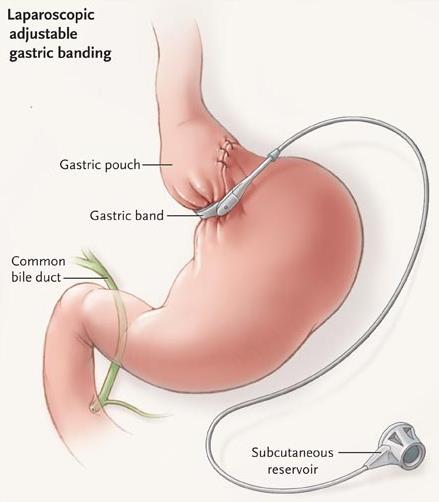
What is Laparoscopic Adjustable Gastric Banding?
In adjustable gastric band (AGB) surgery is a minimally invasive, laparoscopic weight loss surgery that rose in popularity in the late 1990s and early 2000s. It has since been replaced as a preferred surgery by sleeve gastrectomy.
During AGB surgery, a restrictive band is placed around the upper part of your stomach, forming a small pouch with a narrow opening to your lower stomach. An access port connected to the band is placed deep under your skin. The band allows food to be retained in your upper pouch for a longer period of time, causing you feel fuller more quickly. Then, the food passes to your lower stomach and digestion happens normally. There is no change in the way food is absorbed. However, people with bands should still take vitamin and mineral supplements.
Your band will need to be adjusted based on your appetite and symptoms. The band can easily be adjusted by your doctor via the access port and does not require an additional surgical procedure. If the band is too tight, you may have reflux, nausea, and vomiting. If it is not tight enough, you will be able to eat too much and it won’t be effective. Initially, the band may need to be adjusted monthly until the best fill level is reached.
This procedure results in slower weight loss over a longer time (up to three years), and patients who choose AGB lose, on average, more than 40 percent of their excess body weight. Lifelong follow up and care is recommended.
At Penn Medicine, we have multiple bariatric surgery options. Your surgeon will work with you to determine which option is best to help you meet your weight loss and lifestyle goals.
Recovery and Diet after Laparoscopic Gastric Band Surgery
You will need to make significant, long term lifestyle and diet changes in order to achieve and maintain significant weight loss after receiving an adjustable gastric band. Weight loss after this procedure relies more heavily on behavior and choices than on your body's reaction to the surgery. You must consistently make healthy food choices and exercise regularly to be successful. Regular visits with a registered dietitian to learn weight management skills are encouraged.
Penn Medicine offers revisional bariatric surgery if you’ve had less-than-optimal weight loss or weight regain, or if you experienced complications from your original adjustable gastric band procedure.